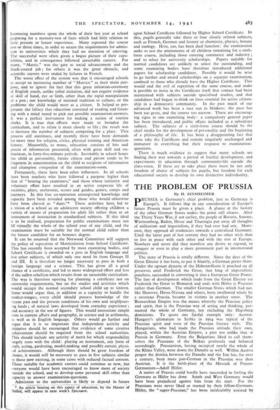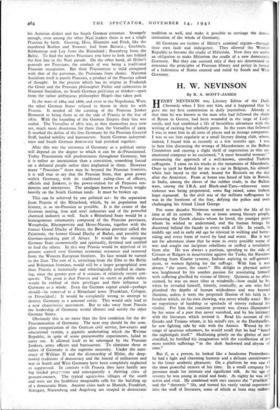THE PROBLEM OF PRUSSIA
By H. SINSHEIMER
pRUSSIA is Germany's chief problem, just as Germany is Europe's. It follows that in any consideration of Europe's future Prussia must be given a place. A glance at the history of the other German States makes the point still clearer. After the Thirty Years War, if not earlier, the people of Bavaria, Saxony, Wurttemberg, Baden, Hesse and Thuringia put away all thoughts - of militarism and imperialism, if they had ever had any. More- over, they opposed all tendencies towards a centralised Germany. Until the latter part of last century they had no other wish than to live in peace with each other and with the rest of Europe. Nowhere and never did they manifest any desire to expand, to conquer or even to play a more prominent part in international politics.
The story of Prussia is totally different. Since the days of the Great Elector it has been, to put it bluntly, a German pirate-State. Under the upstart dynasty of the Hohenzollems it poached on all preserves until Frederick the Great, that king of imperialistic poachers, succeeded in converting it into a European Great Power. The line of development which leads from the Great Elector via Frederick the Great to Bismarck and ends with Hitler is Prussian rather than German. The smaller German States which had not, like Hanover, Hesse-Nassau and others, been swallowed whole by a ravenous Prussia, became its victims in another sense. The Bismarckian Empire was the means whereby the Prussian policy and spirit, that is the Prussian way of acting and thinking, per- meated the whole of Germany, not excluding the Hapsburg dominions. To quote one fateful example only: Austria- Hungary's ultimatum to Serbia in 1914 was typical of the Prussian spirit and even of the. Prussian literary style. The Hungarians, who had made the Prussian attitude their own, played, within the Austrian Empire, a part not unlike that of Prussia in Germany. Even the Bulgarians liked to call them- selves the Prussians of the Balkan peninsula and behaved accordingly. Prussianism, having occupied nearly the whole of the Rhine Valley, went down the Danube as well. Within Austria proper the district between the Danube and the Inn has, for over a century, been more pan-German in the Prussian way than Austrian. It is the birth-place of the Messiah of Prusso- Germanism—Adolf Hitler. i
A'native of Prussia could hardly have succeeded in fooling the Germans as Hitler has done. South and West Germany would have been prejudiced against him from the start. For the Prussians were never liked or trusted by their fellow-Germans. Hitler, the " super-Prussian," has been incalculably assisted by
his Austrian dialect and his South German presence. Strangely enough, even among the other Nazi leaders there is not a single Prussian by birth. Goering, Hess, Himmler and Frick, like the murdered Roehm and Strasser, hail from Bavaria ; Goebbels, Ribbentrop and Ley from the Rhineland ; Rosenberg from the Baltic. To find the native Prussians you have to look just behind the first line in the Nazi parade. On the other hand, all Hitler's generals are Prussians, the conduct of war being a traditional Prussian occupation. But their• Prussianism is mild compared with that of the parvenus, the Prussians from choice. National Socialism itself is purely Prussian, a product of the Prussian school of thought. In the process which has its origins in Frederick the Great and the Prussian philosopher Fichte and culminates. in National Socialism, no South German politician or thinker—apart from the rather ambiguous philosopher Hegel—has taken part.
In the wars of 1864 and i866, and even in the Napoleonic Wars, the other German States refused to throw in their lot with Prussia. It needed all the cunning of the Prussian Junker Bismarck to bring them in on the side of Prussia in the war of 1870. With the founding of the German Empire their fate was sealed. The Versailles of 1871 was, as they themselves may now see, much more disastrous for them than the Versailles of 1919. It marked the defeat of the free Germany by the Prussian General Staff, landed nobility and bureaucrats. South German independ- ence and South German democracy had perished together.
After this war the existence of Germany as a political entity will depend on the degree to which it can be de-Prussianised. Today Prussianism still predominates throughout Germany, but it is rather an intoxication than a conviction, something forced on a defeated people rather than implanted in them. However many " Prussians " there may be beyond the Prussian frontiers, it is still true to say that the Prussian State, that great power within Germany, with its traditional ruling-class of officers, officials and Junkers, is the power-station for all Prussian ten- dencies and enterprises. The amalgam known as Prussia weighs heavily on the South German lands. It must be broken up.
This can be achieved by one political act: by the separation from Prussia of the Rhineland, which, by its population and history, is as un-Prussian as posgible. It is the centre of the German mining, iron and steel industries and of the powerful chemical industry as well. Such a Rhineland State would be a homogeneous community composed of the Prussian provinces, Westphalia, Rheinprovinz and Hesse-Nassau, together with the former Grand Duchy of Hesse, the Bavarian province called the Palatinate, the former Grand Duchy of Baden, and possibly the German-speaking part of Alsace. It would be the strongest German State economically and spiritually, destined and entitled to lead the others. In this way Prussia would be deprived of its present control over German economic resources and removed from the Western European frontiers. Its face would be turned to the East. The rest of it, stretching from the Elbe to the Baltic and Bohemian frontiers, would still be a larger geographical area than Prussia is historically and ethnologically justified in claim- ing, since the greater part of it consists of .relatively recent con- quests. The point is that Prussia and its secret or public rulers would be robbed of their privileges and their influence in Germany as a whole. Even the German capital could—perhaps should—be removed to a Rhineland town (Frankfurt, Cologne, or Dusseldorf.) It would be completely wrong to attempt to destroy Germany as a national entity. This would only lead to a new chauvinistic movement. But to take away from Prussia the leadership of Germany would liberate and satisfy the other German States.
Obviously this is. no more than the first condition for the de- Prussianisation of Germany. The next step should be the com- plete reorganisation of the German civil service, law-courts and educational system, a gigantic undertaking which the Weimar Republic, in spite of some praiseworthy experiments, failed to carry out. It allowed itself to be sabotaged by the Prussian Junkers, army officers and bureaucrats. To eliminate these as rulers of Germany is the supreme necessity. Under the auto- cracy of William II and the dictatorship of Hitler, the deep- rooted traditions of democracy and the hatred of militarism and war in South and West Germany have been completely neglected or suppressed. In contrast v ith Prussia they have hardly any big landed proprietors and consequently a thriving class of peasant-owners. The typical squire-less villages of the south and west are the healthiest imaginable cells for the building up of a democratic. State. Ancient cities such as Munich, Frankfurt, Stuttgart, Nuremberg and Augsburg are steeped in democratic tradition as well, and make it possible to envisage the demo- cratisation of the whole of Germany.
All Germans are victims of Hitler's criminal regime—through their own fault and indulgence. They allowed the Weimar Republic to become the cradle of Hitlerism. Now they are under an obligation to make Hitlerism the cradle of a new democratic Germany. But they can succeed only if they are determined to renounce the principles of Prussian History and policy in favour of a federation of States created and ruled by South and West Germany.























 Previous page
Previous page